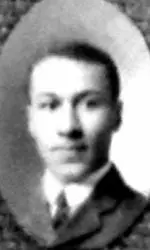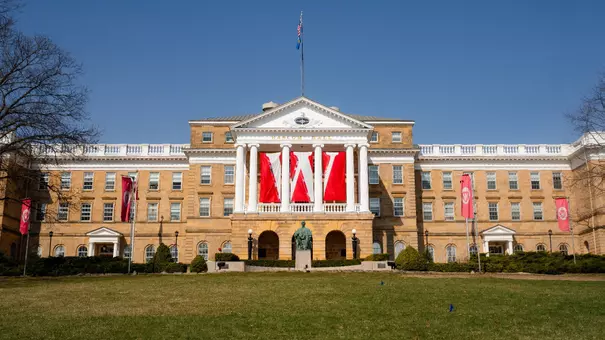
Celebrating UW's African-American Olympians: George Poage
February 05, 2012 | General News
Feb. 5, 2012
• Read more about UW Athletics Black History
MADISON, Wis. -- In anticipation of the upcoming Olympic Games and in celebration of Black History Month, the University of Wisconsin Athletics program will highlight its Aftrican-American Olympians during the month of February.
Today we honor George Poage, the first African-American to win an Olympic medal when he earned two at the 1904 Olympics.
George C. Poage, a member of the University of Wisconsin's class of 1903, was an extraordinary athlete, who claimed many "firsts" during his life. He is most well-known for being the first African-American to win an Olympic medal, but he was frequently a pioneer, and his varied accomplishments set a high standard for those who followed him.
Poage was born in 1880 in Hannibal, Missouri, but his family moved to LaCrosse, Wisconsin when he was still a youngster. He first attracted attention while attending LaCrosse High School, where he excelled as both a student and an athlete. On the playing field, he was easily the school's best athlete, while academically he was the second-best student in his class. At commencement in 1899, Poage, the school's first African-American graduate, addressed the assembly as the salutatorian of his class. 1903 Varsity Track Team. George Poage front row, left. (Source: 1905 Yearbook)
The following fall he began his career at the University of Wisconsin. From the beginning, Poage participated in numerous activities. He remained involved with public speaking and several times represented his peers as an orator for his class. He was also a member of Philomathia, one of the literary societies then active on campus.
He found even greater success on the athletic field. He competed with the freshman track squad in 1900 and joined the varsity track and field team for good during his sophomore year. Poage, the first black athlete to run for UW, specialized in the short sprint and hurdle races, and he was a consistent point winner for the Badgers. In dual meets, he would regularly place in several different events. Against Beloit, in 1903, for example, Poage won the 220-yard dash, the 440-yard dash, and the low hurdles; and he finished second in the 100-yard dash. He also won multiple events in dual meets against Big Ten rivals like Illinois and Chicago.
His hard work and superior ability won him respect on the team. Midway through the 1902 season, the track coach was called out of town, and the Daily Cardinal reported that "while [Coach] Kilpatrick is absent, Mr. Poage will take charge of the track work."
Poage graduated on time with his class in June of 1903. He completed his course in History and wrote his senior thesis on "An Investigation into the Economic Condition of the Negro in the State of Georgia During the Period of 1860-1900."
Not done with his athletic or academic work, however, he returned to the University for the 1903-04 school year and took graduate classes in History. The athletic department helped support Poage's extra year on campus by hiring him to be a trainer for the football team. The new job proved to be a wise investment for Wisconsin, as Poage raised his athletic ability to another level in 1904. At the conference meet in June, he became the first African-American individual Big Ten track champion in league history when he captured first place in both the 440-yard dash and the 220-yard hurdles.
His summer of work had just started, however. The third Olympic games were being held in St. Louis in conjunction with the World's Fair a few months later, and the Milwaukee Athletic Club sponsored Poage to compete. Before the games began many prominent African-American leaders called for a boycott of the events in St. Louis. The organizers of both the Olympics and the World's Fair had constructed Jim Crow facilities for their spectators, and they would not allow an integrated audience to view the spectacle.
The Olympic hosts, however, could not prevent an integrated competition from taking place in St. Louis. Poage chose not to heed the boycott and traveled to St. Louis. He made history when he captured bronze in both the 220-yard and 440-yard hurdles, becoming the first African-American to win Olympic medals.
After the Olympic games, Poage returned to St. Louis to teach at segregated Sumner High School, where he was the head of the English department and helped coach the school's sports teams. He stayed at Sumner for about ten years, before purchasing a farm in Minnesota. He lived in the countryside until after World War One when he moved to Chicago.
At the height of the Jim Crow era, however, there were few job opportunities in Chicago open to an African-American, even a college-educated former world-class athlete. The best employer available to many black Chicagoans was the United States Post Office. Poage secured a job as a postal clerk in 1924 and stayed on the job for nearly thirty years until his retirement in the 1950s. He remained in Chicago until his death in 1962 at the age of 82.
When George Poage graduated from UW in 1903 the caption for his senior photograph declared that he was: "Of matchless swiftness; but of silent pace." This encomium poignantly linked George Poage's career as one of the world's fastest men to his subsequent years toiling anonymously in the Chicago post office.
NOTE: The information in UW's Black History section was researched and provided by Gregory Bond who received his Ph.D. in American history from the University of Wisconsin in 2008. He can be emailed at: badgerhistory@yahoo.com.













